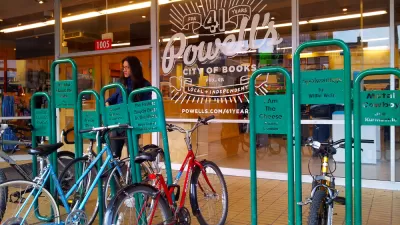A recent law prohibits ‘defensive’ architecture designed to keep people away from buildings or public spaces.

It’s been one year since Brazil passed a law banning “hostile architecture,” infrastructure designed to prevent people from sitting or lying in public spaces. Hostile architecture is widely used around the world to limit access for people deemed ‘undesirable,’ explains Raphael Tsavkko Garcia explains in Next City.
The decree stipulates measures to curb the use of hostile materials, structures, equipment and construction techniques in open spaces for public use. It also requires urban planning tools and policies, such as zoning regulations and building codes, to help prevent the use of hostile architectural elements.
However, some cities have been slow to implement the law, and experts say hostile architecture or “defensive design” is part of a broader social problem. “Architects Elenara Stein Leitão, Oscar Muller and Vinicius Gonçalves tell Next City that hostile architecture is just one facet of ‘a society that focuses on security, often the fruit of social exclusion, in which it would be possible to differentiate into two strands: the security of those who own property and the expulsion of the undesirables.’”
FULL STORY: One Year Ago, Brazil Banned Hostile Architecture. Easier Said Than Done.

Maui's Vacation Rental Debate Turns Ugly
Verbal attacks, misinformation campaigns and fistfights plague a high-stakes debate to convert thousands of vacation rentals into long-term housing.

Planetizen Federal Action Tracker
A weekly monitor of how Trump’s orders and actions are impacting planners and planning in America.

San Francisco Suspends Traffic Calming Amidst Record Deaths
Citing “a challenging fiscal landscape,” the city will cease the program on the heels of 42 traffic deaths, including 24 pedestrians.

In U.S., Urban Gondolas Face Uphill Battle
Cities in Latin America and Europe have embraced aerial transitways — AKA gondolas — as sustainable, convenient urban transport, especially in tricky geographies. American cities have yet to catch up.

Detroit Says Problems With Property Tax Assessments are Fixed. Advocates Disagree.
With higher-valued properties under assessed and lower-valued properties over assessed, advocates say there's still a problem with Detroit's property tax system.

Defunct Pittsburgh Power Plant to Become Residential Tower
A decommissioned steam heat plant will be redeveloped into almost 100 affordable housing units.
Urban Design for Planners 1: Software Tools
This six-course series explores essential urban design concepts using open source software and equips planners with the tools they need to participate fully in the urban design process.
Planning for Universal Design
Learn the tools for implementing Universal Design in planning regulations.
Heyer Gruel & Associates PA
JM Goldson LLC
Custer County Colorado
City of Camden Redevelopment Agency
City of Astoria
Transportation Research & Education Center (TREC) at Portland State University
Jefferson Parish Government
Camden Redevelopment Agency
City of Claremont




























